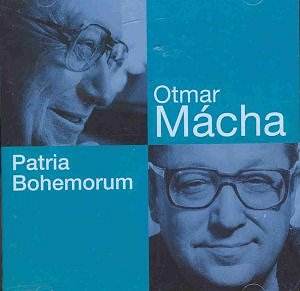Otmar
Mácha is one of the four composers who form the Quattro
group. In addition to Mácha there is Sylvie Bodorová
(b.1954), Luboš Fišer (1935-1999) and Zdenek Lukáš (b.1928).
He
is a prolific composer with three symphoniettas, several oratorios
(including The Legacy of Comenius, 1952-55), film scores,
concertos written for Václav Hudeček, Josef Suk and
Lubomir Brabec. Nora Grumlíková premiered his Double Concerto
for violin and piano with pianist Jaroslav Kolář in 1976.
He has written various operas including Infidelity Trapped,
Lake Ukereve, Roses for Johanka, A Cradle
for Sinning Damsels, The Prometheus Metamorphoses
and Hateful Love. There are also string quartets and
a work The Tears of the Saxophone.
He
has been active in the campaign to restore Mahler's birthplace
house at Kalištĕ near Humpolec in the Czech Republic and
he wrote a choral piece (Welcome Home Mr Mahler) to mark
the campaign. This was also inspired by the singing of Gabriela
Beňačková.
Folk
music from his native Moravia has made itself increasingly prominent
in his works although it is not obviously on display in these
three works. It can perhaps be more easily discerned in the full-length
ballet Broučci (The Fireflies).
The
Land of the Czech Fathers is an oratorio written to a
libretto by Zdeňka Psůtková after the book by Vladislav
Vančura. Vančura looks back to the origins and chimeric
myths of the Czech nation. Potent symbols and characters are used
and the music is elevated and serious. The nine episodes of the
oratorio include a march of Slav tribes to their promised land
while symbols and icons include the old matriarch and the image
of the sacred tree embedded with arrows. The music is gruff, terror
is never far away, there is a glow to the full-blooded singing
(tr.3 2.48), the dies irae is used and there are anthracite-dark
ostinati. Mácha is, in his espousal of grim fate, a descendant
of Fibich in the Hippodamia quartet of melodramas. His
language is not modernistic and highly singable. It is an amalgam
of Brian (Fourth Symphony), Fricker's Vision of Judgement,
Maurice Jacobson’s Hound of Heaven and Bloch's Avodath
Hakodesh. Old Testament awe is in the air. The stridently
protesting Jitka Soběhartová in tr.5 sings like a furious
Luonnotar. In the long concluding chorus (tr.9) the apocalyptic
tone of the singing of the words ‘Napravad, Napravad’ is memorable
as is the long held note and resounding bell sounds. The work
ends in elysian quiet with contented singing; the antithesis of
revolutionary clamour.
The
Richlík Variations mark the death of one
of the pioneeers of avant-garde music in the then Czechoslovakia.
It is more extreme than the oratorio. The Dies Irae is
echoed in the flute at tr. 10. 1.28. Episodes include a swirling
string meltdown of the type found in Josef Suk’s Asrael as
well as a chipper chirping flute at 4.10 and the.30 ritual stamping
dances evocative of The Rite of Spring (8.30). The music
fades into a mildew and lichen. Woodwind and then violins twitter
in what seems to be the last echoes of passing humanity.
The
Violin Concerto preceded the oratorio by a year. The work
has its Rózsa and Bloch touches with the skirl in the violins
seeming very familiar. The soloist's long sinuous line is like
a cross between Walton and Frankel. The music dreams in a wasteland
of pained and stabbing memories as well as momentary consolation.
The central presto is finished in just over three whirlingly active
and blaring minutes. Tougher than the other two works this Concerto
fully deserves its place alongside the Hartmann, Frankel and Berg
concertos. It speaks of a troubled soul and of consolation without
being at all sickly. Ženatý sounds like another Gidon Kremer in
the febrile intensity he brings to the work.
Serious,
sturdy, grave and moving music. I wonder if Arco Diva are considering
another anthology of radio tapes. I certainly hope so. Many of
us need to widen our knowledge of the Czech scene to take in the
likes of Mácha, Bodorová, Kabelac, Fišer and Lukáš.
Rob
Barnett
The
Arcodiva catalogue is now offered by MusicWeb

![]() for
details
for
details